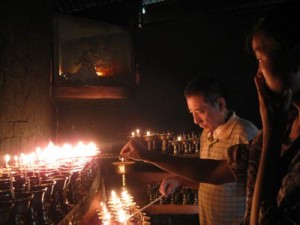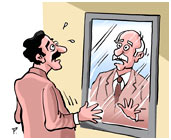The following is an excerpt from a teaching by Jetsunma Ahkon Lhamo called “Bringing Virtue Into Life”
Another thing that happens that’s pretty interesting to me, too, is that while we’re not facing reality we also operate under the delusion that when we come here to practice Buddhism, we’re doing somebody a favor by doing this. It’s the truth. It is the truth. In my 15 years as a teacher, I will tell you I have had this experience again and again and again. Students will come to class and they’ll look at you like “Well I’m here. Isn’t that great? Aren’t you happy? Aren’t you pleased with me?” And then they will say things like “Oh, Jetsunma wants another stupa. So we better build another stupa because Jetsunma wants it.” I don’t need another stupa. I’m very happy with the stupas that we have. In fact I would have been O.K. if we had never built a stupa. Guess who needs the stupa? Come on, you can do this! You do! You’re right! You’re the ones that need the stupa.
Then people will give you this attitude: “Well Jetsunma likes the temple clean so we’d better come and clean the temple.” No, Jetsunma has a real solution. If the temple gets dirty enough, Jetsunma can stay home in her clean house. So Jetsunma really doesn’t need the temple clean. You need the temple clean. You need to do that because the Buddha’s teachings tell us that if you build a stupa or care for the body of the three precious jewels—and here the three precious jewels, the Buddha, the Dharma and the Sangha are housed in this temple—then you are accumulating merit. You are changing your life. You are benefitting yourself and you are moving closer to enlightenment by accumulating merit and purifying your own nonvirtuous deeds, which all of us have accumulated. We have all had nonvirtuous deeds in our past, but we don’t want to face that. We don’t want to think like that. We don’t want to think that we have any needs at all. We don’t really want to look at our own fragile situation. We are afraid and we don’t want to admit it.
My experience has been that we are in such denial about our situations that we literally paralyze ourselves on the path. We prevent ourselves from going very far because we have not cultivated the kind of thinking that permits us and encourages us to practice more deeply and to go further on the path than we are going. Many of us are resistant to contributing to the temple. We are interested in coming to receive the teachings and then we are interested in going home and enjoying the rest of the day. We are interested in bringing friends to this exotic place. We are interested in seeing what this is all about. If any of you have received empowerments in the Vajrayana tradition, the Tibetan tradition, you know that we get pretty high church around here. We have a lot of ritual. We have a lot of color. And if you’ve come when the Tibetan lamas are here, you know that we have ritual instruments and ritual music and all sorts of really interesting exotic things. Unfortunately, many people come and dabble in Dharma simply because it is so exotic. But they miss the essential point and that is the Buddha’s heart advice to you, the Buddha’s heart teaching. That heart teaching, that heart advice, is encompassed and embraced in the thoughts that turn the mind towards Dharma. Those thoughts are, first of all, that we are existing right now in a precious and rare human rebirth. According to the Buddha’s teaching, it is very difficult to achieve this human rebirth. In order to achieve this human rebirth, you have to have number one, accumulated enough virtue, enough merit in your past, and number two, you have to have made some effort to move towards realization or to move towards benefitting others. There has to have been some element of movement toward the spiritual in your past.
Remember that those who have taken a lower rebirth such as the animals, are not capable of thought like that at all so they will not be accumulating the causes for a human rebirth in their present lifetime. They will not be able to do that. According to the Buddha’s teaching, however, we have somehow managed to achieve this human rebirth. A great way to understand how rare that would be and how miraculous it is, is to think about a gambling place like Atlantic City or Los Vegas, you know, where they have those machines called the One Armed Bandit. You pull the machine and a fruit comes up—a lemon or a cherry. It’s a gambling machine, a slot machine. Isn’t that what that is? So, our achieving a precious human rebirth is a bit like coming up with the three cherries in a row and you get the prize. But it is infinitely more rare than that. Infinitely more rare than that.
Copyright © Jetsunma Ahkon Lhamo. All rights reserved









